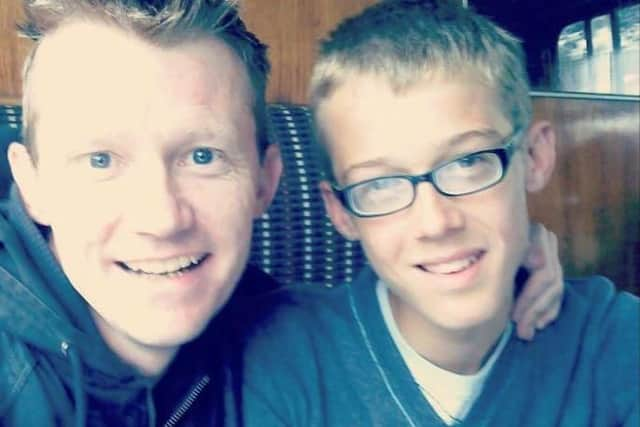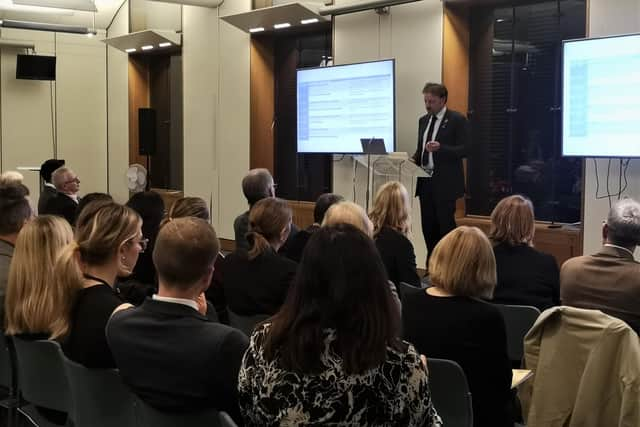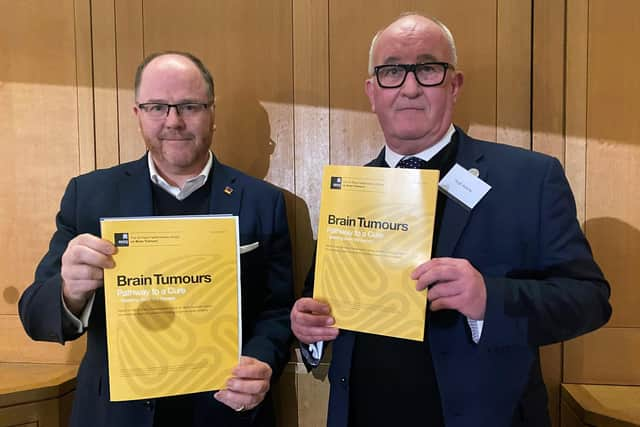West Sussex chef who lost son, 26, to brain tumour demands action to save future lives
and live on Freeview channel 276
Tony Franklin’s son, Dan, was diagnosed with an inoperable glioblastoma (GBM) in October 2020 after suffering with balance problems and sickness. He underwent radiotherapy and chemotherapy but died 13 months later, aged just 26.
Worthing resident Tony, who is head chef at Wilton Park Conference Centre in Steyning, said: “Until this horror becomes your family’s reality, you have no idea what brain tumours really are, nor that they are the biggest cancer killer of children and adults under the age of 40 and only one per cent of the national cancer spend is allocated to this truly devastating disease.”
Advertisement
Hide AdAdvertisement
Hide AdAn inquiry by the All-Party Parliamentary Group on Brain Tumours (APPBGT) has revealed that there has been a ‘concerning lack of deployment’ of £40 million worth of investment – which had been promised since 2018. It has been alleged that just £15 million has reached the hands of researchers in the five years since it was promised.


“To now learn that the £40 million funding promised by the Government hasn’t materialised is shameful,” Tony said. “It makes me angry, disappointed and sad that my boy could have been given more help, treatment and, ultimately, time. Where have these missing millions gone?
“Dan, like all other brain tumour sufferers and their families, did not have the luxury of time.
"We lost him 13-months after his diagnosis when he was just 26-years-old. To think that something could have been done if the funds promised had found their way into the hands of researchers only adds to our grief and what might and could have been for him.
Advertisement
Hide AdAdvertisement
Hide Ad"We didn’t have long enough with our son and this just adds more salt to a still raw and open wound. It is unthinkable that in this day and age, so few treatment options are available.”


The Department of Health and Social Care has since issued a statement in response. A spokesperson said: “Brain cancer can be a devastating disease - which is why we’ve specifically allocated £40 million for research in this area, on top of £1 billion for wider health research a year.
“We’ve invested in every suitable application made and the funding will continue to be available for further studies to develop new treatments and therapies for brain tumours.
“To encourage further successful applications, we are investing in infrastructure, workshops for researchers and training for clinicians.”
Advertisement
Hide AdAdvertisement
Hide AdThe APPBGT – for which charity Brain Tumour Research provides the secretariat – has called for wide-ranging changes to be made in how research into the disease is funded in its latest inquiry, Report Pathway to a Cure – Breaking Down the Barriers.


It calls out the current funding system as ‘unfit for purpose’ and claims patients and families ‘continue to be let down’.
It also raises issues in the treatment of terminally ill children, who were ‘denied access’ to last resort clinical trials despite their parents’ wishes.
Derek Thomas MP, who chairs the APPGBT, said the promise of £40 million ‘gave cause for optimism’ and ‘heralded a very welcome shift in focus’ – “especially considering the historic underfunding of research into brain tumours which has received just one per cent of the national spend on cancer research since records began.
Advertisement
Hide AdAdvertisement
Hide Ad“However, our investigations have revealed a concerning lack of deployment of these funds with just £15 million reaching the hands of researchers in the five years since it was promised.”
Since the government announcement of £40 million, the National Institute for Health and Care Research (NIHR) has committed £16 million on brain tumour research. This is £10.7 million across 13 research programmes and an additional £5.3 million through the NIHR Biomedical Research Centres.
The Department of Health and Social Care said it expects to spend more as new research progresses and this funding will be rolled over to the next financial year.
All applications that have been assessed as fundable in open competition have been funded.
Advertisement
Hide AdAdvertisement
Hide AdThe APPGBT report was published on Tuesday, February 28 – on the eve of national Brain Tumour Awareness Month. It was launched at a Westminster reception, jointly hosted by Brain Tumour Research and the Tessa Jowell Brain Cancer Mission which launched a separate report giving extensive insights into NHS brain cancer services, highlighting significant geographic variations.
The APPG report also highlighted a so-called ‘valley of death’, in which potential new treatments discovered in the laboratory fail to reach patients because of ‘unnecessary complexity’ in the way research is funded.
Mr Thomas added: “We are hearing that the current system is too complicated, it doesn’t connect laboratory work with what is happening in clinics, that there is no up to date and robust database for people to understand if they could be eligible for clinical trials and that far too little of the money previously promised has reached the hands of the researchers who can make a difference.
“The sad fact is that brain tumour patients do not have the luxury of time. The Government must act now in order to recognise brain tumour research as a critical priority, appoint a champion, and ringfence sufficient funds to make a difference.”
Advertisement
Hide AdAdvertisement
Hide AdThe government has been recommended to recognise brain tumour research as a ‘critical priority’, ring fencing £110 million of current and new funding.
A spokesperson added: “The research funding system has been built in silos and needs to be joined up from basic science through to clinical trials. Patients with brain tumours should have equity of access to trials of new anti-cancer drugs
“Funding bodies should ring-fence specific funding for research into childhood brain tumours where survival rates for the most aggressive tumours have remained unchanged for decades leading to frustrated families seeking costly and unproven treatment abroad.”